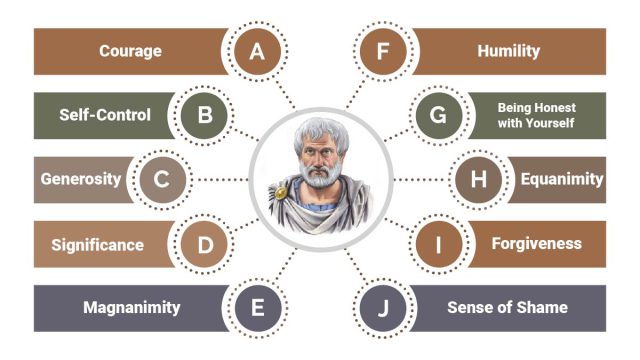In a world where the pursuit of happiness is a common goal, the wisdom of ancient philosophers like Aristotle can offer valuable guidance for contemporary individuals seeking a fulfilling and joyful life. Aristotle’s notion of ‘eudaimonia,’ often translated as ‘good spirit’ or positive consciousness, underscores the idea that happiness is not a fleeting emotion but a state of being that can be nurtured through virtuous living. Embracing Aristotle’s 10 virtues can pave the path toward content and meaningful existence in today’s fast-paced world.
1. Courage: Triumph Over Fear
Aristotle’s perspective on courage, while rooted in contexts like battlefield bravery, still resonates in the modern world. In today’s era of social media and cancel culture, courage involves standing up for one’s convictions and facing adversity head-on. Research demonstrates that courage is intertwined with happiness, as it leads to resilience, enabling individuals to bounce back from challenges stronger and more determined.
2. Self-Control: Balancing Desires
Aristotle’s emphasis on self-control remains pertinent, albeit with a modern twist. Temperance, or the ability to manage personal desires and impulses, is crucial in an age of instant gratification. Adhering to the principle of moderation can foster well-being by preventing excesses that often lead to dissatisfaction and regrets.
3. Generosity: Beyond Material Wealth
Generosity, as Aristotle saw it, extends beyond monetary giving. It encompasses benevolence in all forms and aligns with modern findings that suggest acts of kindness and giving contribute to individual well-being. Generosity fosters a sense of connection, igniting positive emotions that contribute to overall happiness.
4. Significance: Pursuit of Excellence
The concept of ‘significance’ advocated by Aristotle translates to the modern notion of excellence. Instead of settling for mediocrity, Aristotle encourages individuals to aim for the highest standard in their pursuits. This aligns with the principle of ‘altruism,’ where the satisfaction derived from contributing meaningfully to others’ lives leads to personal fulfillment.
5. Magnanimity: Expansive Outlook
Aristotle’s concept of magnanimity encompasses the expansion of one’s mind and spirit. Today, this relates to nurturing a broader perspective, distancing oneself from the shallow distractions of social media, and engaging in intellectually enriching activities like reading. This pursuit of depth and insight is a direct route to experiencing joy beyond fleeting pleasures.
6. Humility: Embracing Compassion
Humility, as Aristotle presented it, is grounded in compassion and emotional self-regulation. Studies reinforce his wisdom, revealing that negative thoughts and arrogance contribute to decreased well-being. Practicing humility not only enhances personal contentment but also strengthens interpersonal relationships.
7. Being Honest with Yourself: Authenticity Matters
Aristotle’s emphasis on honesty and self-awareness resonates today more than ever. Authenticity involves understanding one’s strengths and weaknesses without exaggeration or self-deprecation. A healthy self-image promotes resilience and diminishes anxiety and dissatisfaction.
8. Equanimity: Contentment Amidst Inequality
Aristotle’s concept of equanimity encourages contentment regardless of circumstances. While modern discussions often focus on social justice, Aristotle’s perspective calls for a mindset of appreciating one’s due, regardless of its magnitude. This mindset of acceptance and contentment is a direct conduit to happiness.
9. Forgiveness: Empathy and Tolerance
Forgiveness, in Aristotle’s eyes, means being understanding and patient with others’ shortcomings. Modern research supports the idea that practicing forgiveness reduces feelings of frustration and distress. By cultivating empathy and refraining from resentment, individuals can create a more positive emotional space for themselves.
10. Sense of Shame: Upholding Virtue
Aristotle’s view of a sense of shame is akin to moral integrity. Modern interpretations align it with modesty and ethical conduct. This principle encourages individuals to avoid actions that compromise their values, leading to lasting contentment and fulfillment.
Aristotle’s teachings provide a timeless blueprint for crafting a fulfilling life. While the modern world offers new challenges and distractions, the core principles of courage, self-control, generosity, significance, magnanimity, humility, authenticity, equanimity, forgiveness, and a sense of shame remain profoundly relevant. By embracing these virtues, individuals can cultivate a deep and lasting sense of well-being, aligning themselves with the ancient wisdom that happiness is a result of intentional effort rather than mere luck. The journey toward eudaimonia is a lifelong pursuit, and Aristotle’s wisdom remains a guiding light in the pursuit of a meaningful and joyful existence.
Here are some links for our readers with valuable perspectives from reputable sources that support and expand upon the concepts discussed in this article. Enrich yourself.
- Psychology Today – The Science of Happiness: Link to a relevant article that discusses modern research on happiness and how it intersects with Aristotle’s virtues. Psychology Today – The Science of Happiness
- Greater Good Magazine – The Power of Generosity: External link to an article that explores the positive impact of generosity on well-being. Greater Good Magazine – The Power of Generosity
- TED Talk – The Art of Being Yourself: Link to a TED Talk that discusses authenticity, aligning with Aristotle’s emphasis on being honest with oneself. TED Talk – The Art of Being Yourself
- Mindful – Practicing Equanimity: External link to an article that elaborates on the concept of equanimity and how it relates to modern mindfulness practices. Mindful – Practicing Equanimity
- PositivePsychology.com – The Science of Forgiveness: Link to an informative resource discussing the benefits of forgiveness and how it ties into well-being. PositivePsychology.com – The Science of Forgiveness
- Harvard Business Review – The Value of Authenticity: External link to an HBR article discussing the business value of authenticity and its implications in personal life. Harvard Business Review – The Value of Authenticity
- Verywell Mind – Cultivating Resilience: Link to an article on building resilience, connecting Aristotle’s emphasis on courage with modern strategies. Verywell Mind – Cultivating Resilience
- The Greater Good Science Center – How to Cultivate Humility: External link to an article providing practical insights on fostering humility for well-being. The Greater Good Science Center – How to Cultivate Humility
Read more from Editorial Section: Click Here















